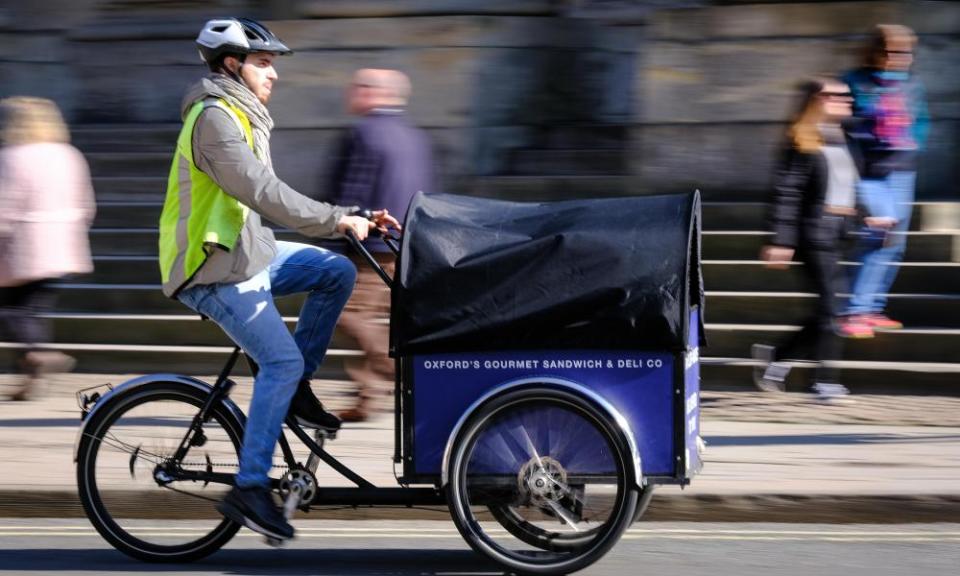WFH? The coffee (and prosecco) van coming to a British street near you

“Stop me and buy one” is a slogan traditionally used by ice-cream sellers. Now you may be as likely to find coffee, bread, cakes and sandwiches being sold up and down your street.
Growing numbers of cafes and caterers forced to stop trading during the lockdown are investing in vans with espresso machines or repurposing milk floats to deliver to customers working from home.
Many are hoping to capitalise on the burgeoning community spirit in cities, sparked by #ClapForCarers and the WhatsApp neighbourhood groups that sprang up when lockdown began.
In south London, Zoe Watkins, co-founder of Livewire Kitchen, is closing two of her three cafes and switching to a van – Little Livewire – selling coffee, superfoods and natural, energy-boosting drinks.
“We’re talking to people locally to ask them where they want us to go,” Watkins said. “Each area has a Facebook community and we’re talking to them, saying we can come to one place every Wednesday morning, another place on Thursday, and so on.”
There could be a major shift in our economy. It makes sense to go to where the customers are.
Mark Laurie, catering chief
The van has sides that fold down to reveal an espresso machine, and has an onboard water supply. It takes about 20 minutes to set up and Watkins hopes a regular meeting point close to people’s homes will help cement community ties.
This is just one of many similar operations. The owners of the Dusty Knuckle bakery and cafe in east London have repurposed a milk float to take bread and pastries to customers across the city. They publish a weekly schedule of where they will be so customers can pop out to browse the wares outside their front doors. The experiment appears to be a success, with socially distanced queues of people waiting to be served.
At least 3,000 catering vans in the UK could provide a similar local service but are hampered by red tape, according to the Nationwide Caterers Association (NCASS). In addition to hygiene and food standards checks, mobile caterers also need a street-trading licence from every local authority area they operate in.
“It’s something we expect to increase over the next few months, but the problem is licensing,” NCASS director Mark Laurie said.
“There’s a lot of confusion about what is legal and what catering vans are allowed to do,” Laurie said. “Councils are so busy and don’t have enough staff to deal with applications.” Click-and-collect services don’t need to be licensed, but stopping in the street requires a permit, although private land is exempt.

“There could be a major shift in our economy. It has been happening a lot in villages – fish and chip vans doing rounds, a different village each day. But it hasn’t happened so much in the cities. We think we should be able to apply for pavement licences.
“The viability of central London restaurants and food-to-go places is in question because office workers aren’t there. It makes sense to go to where the customers are.”
Many workers are unlikely to return to their offices for months – if they ever do. Google staff will work from home until at least July 2021. Coca-Cola, Unilever, Vodafone, Pearson, KPMG and a host of other firms said last week they would not reopen offices until next year at the earliest.
Pret a Manger is closing 30 of its 410 shops and other firms are likely to follow as the government furlough scheme ends.
On Saturday, the government changed its guidance to encourage employees back into workplaces in order to help restart the commuter economy. It had been under pressure from Conservative MPs such as Iain Duncan Smith who said employers were “absolutely bloody mad for not getting more employees back”.
Before the pandemic, around 1.7 million people were mainly working from home, according to the Office for National Statistics. By June, 49% of the workforce – about 16 million people – had been working from home for at least part of the week.
That represents a huge untapped market, says NCASS, but many members are uncertain about the complex rules governing street trading.
Related: ‘I’ve not been to the city centre for months’: UK suburbs thrive as office staff stay home
Pete Hewitt, who reached the 2015 MasterChef final and won at the European Street Food Awards last year, has a Japanese-inspired food truck called Homeboys which is usually seen at food festivals but has been out on Nottingham streets. “We would have done more but the licensing was very complicated,” he said. “At the beginning of lockdown, we found a disused old restaurant and started selling there but we did have complaints. The licence costs £180 a year, which is fine if you’re doing it all the time but at the moment no one knows what’s going to happen.”
In London, Watkins’s mobile van is being made by the Big Coffee, which sells converted Piaggio vans to street-food traders and others such as Yorkshire Tea, Upper Crust, Unilever and Subway for £10,000 to £70,000. It also converts buses, taxis and VW campervans and offers a £6,000 pedal-powered espresso trike for fit baristas.
“We’ve been going for 20 years and this is the busiest we’ve been,” the firm’s director Rob Dixon said.
“It’s not just coffee – we also do prosecco vans, craft beers, cocktails, food, ice-cream. I spoke to someone the other day who is developing an app on which people can order coffees and he’ll do a delivery round.”

 Yahoo Finance
Yahoo Finance 